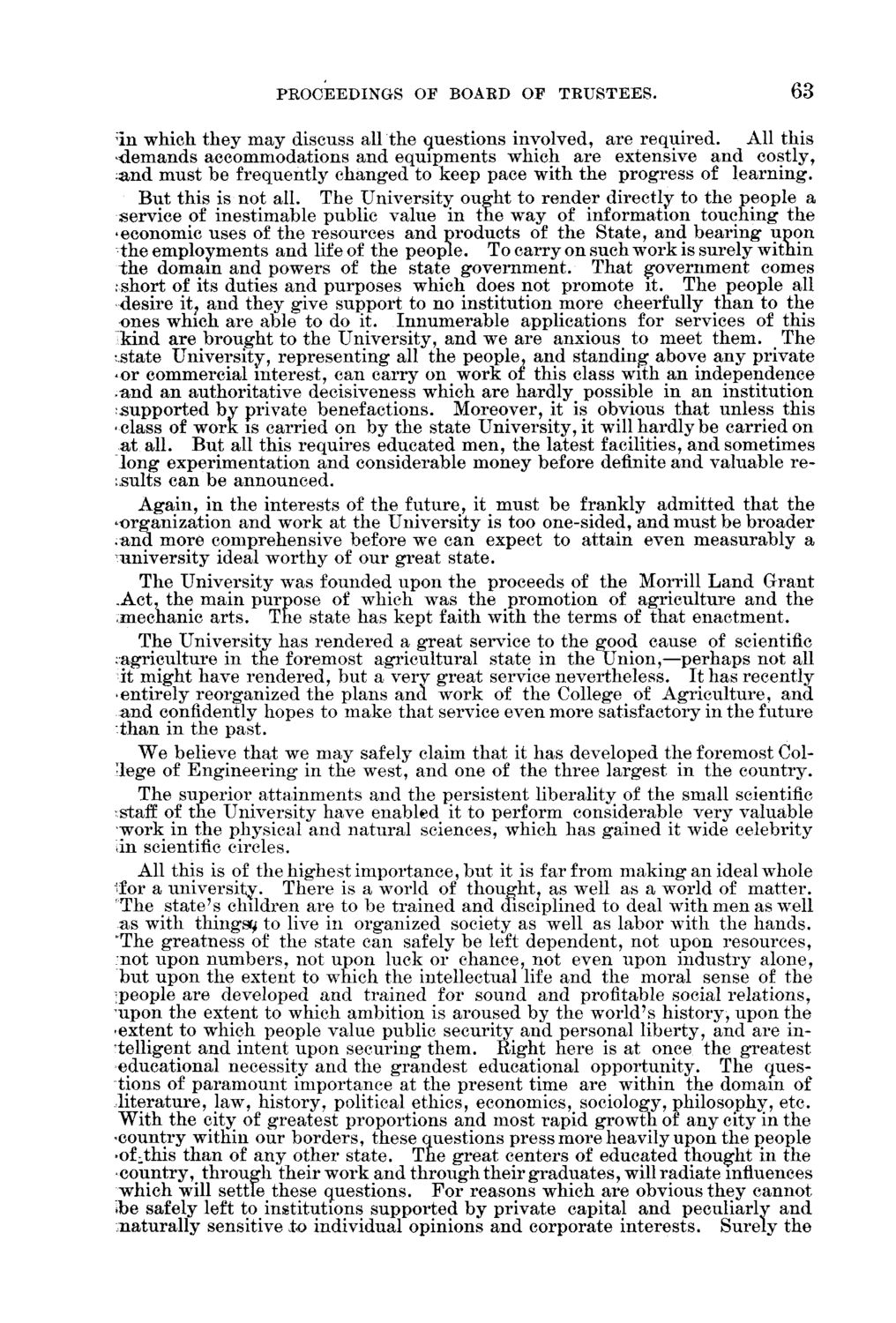| |
| |
Caption: Board of Trustees Minutes - 1896
This is a reduced-resolution page image for fast online browsing.

EXTRACTED TEXT FROM PAGE:
PROCEEDINGS OF BOARD OF TRUSTEES. 63 i n which they may discuss all the questions involved, are required. All this demands accommodations and equipments which are extensive and costly, and must be frequently changed to keep pace with the progress of learning. But this is not all. The University ought to render directly to the people a service of inestimable public value in the way of information touching the • economic uses of the resources and products of the State, and bearing upon the employments and life of the people. To carry on such work is surely within ihe domain and powers of the state government. That government comes .short of its duties and purposes which does not promote it. The people all desire it? and they give support to no institution more cheerfully than to the ones which are able to do it. Innumerable applications for services of this kind are brought to the University, and we are anxious to meet them. The •.state University, representing all the people, and standing above any private -or commercial interest, can carry on work of this class with an independence •and an authoritative decisiveness which are hardly possible in an institution supported by private benefactions. Moreover, it is obvious that unless this • class of work is carried on by the state University, it will hardly be carried on at all. But all this requires educated men, the latest facilities, and sometimes long experimentation and considerable money before definite and valuable results can be announced. Again, in the interests of the future, it must be frankly admitted that the ^organization and work at the University is too one-sided, and must be broader .and more comprehensive before we can expect to attain even measurably a university ideal worthy of our great state. The University was founded upon the proceeds of the Morrill Land Grant .Act, the main purpose of which was the promotion of agriculture and the mechanic arts. The state has kept faith with the terms of that enactment. The University has rendered a great service to the good cause of scientific -agriculture in the foremost agricultural state in the Union,—perhaps not all it might have rendered, but a very great service nevertheless. It has recently entirely reorganized the plans and work of the College of Agriculture, and and confidently hopes to make that service even more satisfactory in the future than in the past. We believe that we may safely claim that it has developed the foremost College of Engineering in the west, and one of the three largest in the country. The superior attainments and the persistent liberality of the small scientific ;staff: of the University have enabled it to perform considerable very valuable work in the physical and natural sciences, which has gained it wide celebrity lin scientific circles. All this is of the highest importance, but it is far from making an ideal whole ifor a university. There is a world of thought, as well as a world of matter. The state's children are to be trained and disciplined to deal with men as well as with things^ to live in organized society as well as labor with the hands. "The greatness of the state can safely be left dependent, not upon resources, not upon numbers, not upon luck or chance, not even upon industry alone, but upon the extent to which the intellectual life and the moral sense of the people are developed and trained for sound and profitable social relations, upon the extent to which ambition is aroused by the world's history, upon the • extent to which people value public security and personal liberty, and are intelligent and intent upon securing them. Right here is at once the greatest educational necessity and the grandest educational opportunity. The questions of paramount importance at the present time are within the domain of literature, law, history, political ethics, economics, sociology, philosophy, etc. With the city of greatest proportions and most rapid growth of any city in the •country within our borders, these questions press more heavily upon the people 'of^this than of any other state. The great centers of educated thought in the •country, through their work and through their graduates, will radiate influences which will settle these questions. For reasons which are obvious they cannot Ibe safely left to institutions supported by private capital and peculiarly and naturally sensitive to individual opinions and corporate interests. Surely the
| |